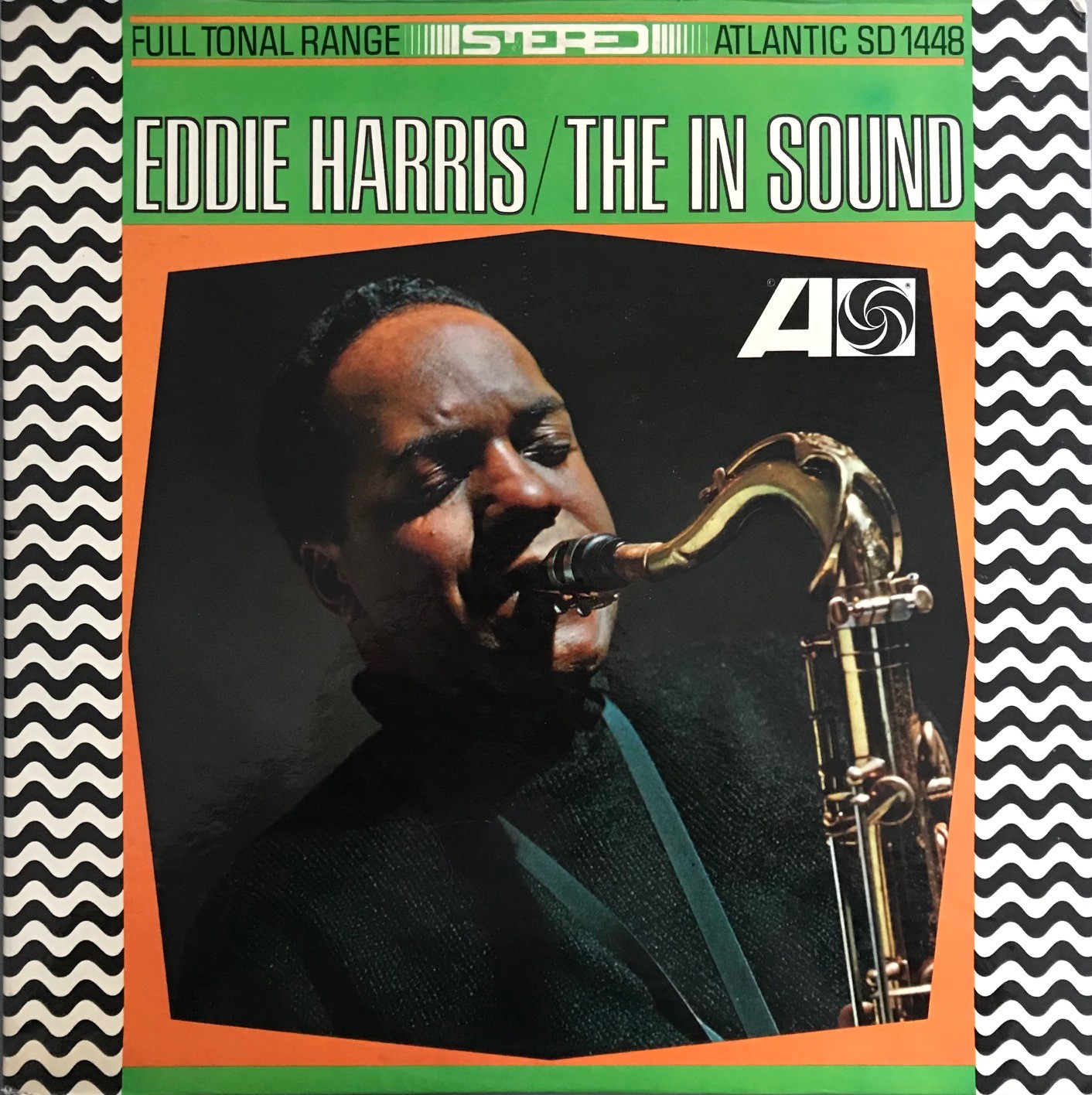Folk hero in his prime.
Personnel
Eddie Harris (tenor saxophone), Ray Codrington (trumpet A1, B1, B2), Cedar Walton (piano), Ron Carter (bass), Billy Higgins (drums)
Recorded
on August 9 & 25 in New York City
Released
as Atlantic 1448 in 1966
Track listing
Side A:
Love Theme From “The Sandpiper” (The Shadow Of Your Smile)
Born To Be Blue
Love For Sale
Side B:
Cryin’ Blues
‘S Wonderful
Freedom Jazz Dance
“El Cheapo.” That’s how Eddie Harris apparently called himself in the mid-1980’s. The tenor saxophonist was recording in the studio of engineer Max Bolleman in Monster in The Netherlands and Max was thinking that this was kind of weird. Harris introduced and continued to define himself as “El Cheapo.” His toying with various electronical devices, especially when broken down due to faulty wiring, was accompanied by self-deprecating remarks. “Oh yeah that figures, I’m ‘El Cheapo’”.
It is weird. Perhaps best ranked in the realm of irony? Chicago-born Eddie Harris started out with a big bang and enjoyed a major hit with his version of the theme song from the movie Exodus in 1960. A beautiful, breezy tune that showcased Harris’s upper register sounds of the tenor saxophone. He changed course in the mid-1960’s and followed his own path on the Atlantic label, recording a series of gritty avant-soul jazz records featuring amplified saxophone. Another unlikely hit was scored with the live Swiss Movement LP with pianist Les McCann in 1971. Okay, but to get back to irony, Harris subsequently released various surprising albums with r&b and vocals, among those the comedy album The Reason Why I’m Talking Shit. His best-known tune from the period is Eddie Who? Seriously funny tune. And ambiguous, mentioning various contributions of Harris to jazz. I remember when you used to play with Count Basie / That was Eddie “Lockjaw” Davis / My name is Eddie Harris / I’ve got one of your videos jack / That was Eddie Murphy / My name is Eddie Harris.
We haven’t forgotten you, Eddie. On the contrary. Which jazz musician has enjoyed two major hits in his career? He may have been under the radar in the latter part of his life. But various people have sung praise during his lifetime and since his death in 1996. Just a few examples, staying close to the premises of Flophouse Magazine. Tenor saxophonist Eric Alexander considered Harris’s solo on You’ll See on Jimmy Smith’s All The Way as the ‘best blues solo in F ever’. Swiss drummer Florian Arbenz recorded a different version of Harris’s Freedom Jazz Dance on every issue of his twelve-LP saga Conversations. Finally, Dutch alto saxophonist Benjamin Herman praised Harris courageous crossover mentality, mentioning Mean Greens as one his favorite records.
Freedom Jazz Dance was featured on The In Sound, released in 1966. It was the first record after his mainstream period on VeeJay and Columbia that demonstrated a will to experiment, albeit not yet with ‘electric sax’ or various amplified instruments. It was the first album that put Harris’s thorough understanding of Coltrane’s playing in the limelight. The LP featured Cedar Walton, Ron Carter and Billy Higgins. Major-league company, in its prime.
Evidently, Freedom Jazz Dance is the album’s high-profile and lasting composition. It was famously covered by Miles Davis on Miles Smiles in 1967. It is still marvelous and fresh. If only for the tremendous groove, kickstarted by the gritty counter beats of Carter, Walton and Higgins, which is strengthened by the churchy pattern of the tambourine. Carter’s booming sound and long notes ring through the breaks like school bells. On top of all this is the playful, Ornette Coleman-ish melody. It’s hypnotic, it’s like being at a party that grows more cheerful and intense by the hour, like being among people with uncommonly good, uplifting vibes, merging in a trance in a dance in a buffalo stance.
Eddie blows a fuse. It’s the climax of a record that started with Harvey Mandel’s The Shadow Of Your Smile from The Sandpiper, Harris was asked to add another movie theme song and says in the liner notes that he said why not, making it his own with his typically punchy, no-nonsense tone and down-to-earth, well-paced phrasing. He blows a meaty ballad and a roaring blues and goes Gershwin, everything vivid and accessible. He’s pushing the envelope but giving people their money’s worth. A wild man, a kind of Rufus Thomas on sax.
He goes Porter with the hard-hitting Love For Sale, marked by an overwhelming tornado of notes, as if the sound of the heavy tread of the heavy feet from the lonesome cop that introduces the nocturnal endeavors of the tale’s world-wary prostitute in the red light district is washed away by the frenzied footsteps of a dozen violent gnomes.
Eventful transitional record by El Cheapo. Nothing cheap about it, mind you.

